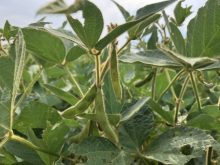Fight-or-flight” is not an option for plants, unfortunately, when it comes to pathogen attacks. Instead, plants opt for “do-or-die.”
A deeper insight into the genetic mechanisms that enable plants to resist pathogen infections has equipped researchers with tools to tackle the most devastating pathogens in agriculture. Using advanced RNA sequencing, researchers have recently uncovered how varieties of soybean respond to different types of soybean cyst nematodes (SCNs), with potential implications for developing more resilient crops and reducing reliance on chemical treatments.
A study led by Mst Shamira Sultana, from the Hewezi Lab at the University of Tennessee, revealed new insights into the genetic mechanisms that enable soybean plants to resist infection by SCN. The study explored how both resistant and susceptible soybean varieties react at the genetic level when exposed to SCN. The researchers investigated the alterations in gene expression in soybean roots during SCN infection.
Read Also

Claas brings 1000 Series SP forage harvesters to Canada
In mid-August, Claas unveiled its new line of Jaguar forage harvesters at an event in Visalia, California, deep in the heart of that state’s dairy region.
The results revealed that resistant plants ramp up the activation of genes involved in immune responses, effectively protecting them from damage. In contrast, susceptible plants failed to activate these critical defense genes, leaving them vulnerable to nematode attack. Interestingly, this research also highlighted that certain genes are regulated in opposite ways depending on the plant’s resistance status, offering new insights into how plants distinguish and respond to different types of nematode threats.
By manipulating specific genes that render plants susceptible or resistant to pests, researchers aimed to enhance resistance in otherwise vulnerable plants. The research is also revealing how soybean varieties have different genetic responses to various types of soybean cyst nematodes.
“This research not only enhances our understanding of plant defense mechanisms but also opens up new possibilities for breeding soybeans that are naturally more resistant to nematode infections,” said Tarek Hewezi, plant pathology professor and head of the Hewezi Lab.
The impacts of this study are far reaching. SCNs cause billions of dollars in crop losses worldwide each year, threatening food security and progress toward sustainable agriculture. By focusing on the genes that control resistance, scientists can work to breed soybeans that naturally resist nematodes, reducing the need for chemical pesticides.














